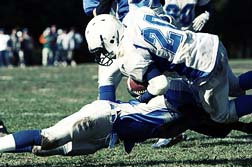 The shoulder pain pump is a device that delivers pain medication directly to a surgical site. Doctors have found the pain pump to be effective in the delivery of pain medication to the soft tissue surrounding the shoulder joint.
The shoulder pain pump is a device that delivers pain medication directly to a surgical site. Doctors have found the pain pump to be effective in the delivery of pain medication to the soft tissue surrounding the shoulder joint.However since 1999 a growing number of surgeons, based on information allegedly supplied by shoulder pain pump manufacturers, began the practice of using the shoulder pain pump to deliver pain medication directly to the shoulder joint itself, to alleviate pain after shoulder surgery.
It has since been discovered that pain medications, in certain combinations, react negatively with shoulder cartilage. The cartilage has been found to break down prematurely—and as cartilage does not re-generate, patients face further surgery or a lifetime of pain and limited mobility.
More than 100 lawsuits have been filed across the US, with nine based in Arizona. Three were filed back in the summer, with the remaining five filed earlier in 2009. All 9 Arizona lawsuits were filed in US District Court of Arizona.
The 9 plaintiffs are asking for a combined $68 million in damages, and accuse the various manufacturers of failing to warn the medical community that shoulder pain pumps could have an adverse effect on patients.
It's a huge issue that appears not to be without controversy. According to the lawsuits, the US Food and Drug Administration (FDA) did not give manufacturers of shoulder pain pumps clearance to use the devices to deliver pain medication directly to the should joint itself—only to the soft tissue around the shoulder.
The lawsuits allege that manufacturers did not share this fact with doctors, who were thus misled into believing the delivery of pain medication directly to the shoulder joint was safe.
It should be noted that, according to reports, the FDA might have played a role in confusing the issue.
In June of 1998 McKinley Inc., of Denver, made applications to the FDA for use of its pain pump for postoperative shoulder pain and related orthopedic surgeries. The request was for permission to inject pain meds into the surgical site via the pain pump for a period of not more than 72 hours following surgery.
Approval was granted by the FDA for use with soft tissue around the shoulder area, but NOT for injection inside the shoulder joint itself. However, it was later found that the FDA had initially approved the wrong indication by mistake, but didn't catch the gaffe until Stryker Corporation attempted to gain similar approval for its device, about 5 months later.
It has been reported that the FDA set the record straight with other manufacturers once the error was caught. However, either the message didn't get through, or it was ignored. An attorney associated with the Arizona lawsuits suggested,"All the manufacturers knew this. Unfortunately, from 1999 on, these pain pumps were being marketed for use for interarticular, or inside the joint."
Whether it was ignorance or greed, for Matthew Goldstein the damage is done. The 22-year old injured his shoulder playing football at the University of Massachusetts. He underwent shoulder surgery in 2004, and five or six months later the pain returned. X-rays to his shoulder revealed that the cartilage had broken down. Mathew's doctor told him the anesthetics delivered to the joint by the should pain pump had 'burned the cartilage.'
Now 27, Goldstein's football career was over. And his story is just one of hundreds, if not thousands of stories. Cole Chapman is another Arizona plaintiff who hurt his shoulder playing baseball. The use of a shoulder pain pump following surgery left him potentially in need of shoulder replacement surgery. It's a procedure that's not cheap. He would be facing a bill of $200,000.
Shoulder pain pump manufacturers defend their devices. However, according to attorneys close to the case there have been a nationwide rash of chondrolysis, which is a complete breakdown of cartilage in the shoulder joint, between 2000 and 2007—a time frame that aligns with the then-enthusiastic adoption by surgeons of shoulder pain pumps for interarticular use. Doctors believed them to be safe, and it is alleged that manufacturers did not tell them otherwise.
READ MORE SHOULDER PAIN PUMP LEGAL NEWS
Many, like Matthew Goldstein, are young and suffer a career-ending catastrophe resulting from something designed to help them, not harm.
There are more than 100 lawsuits nationwide, and there likely will be more. If you, or a loved one has suffered chronic shoulder injury following shoulder surgery that involved a post-operative shoulder pain pump, speak to a qualified attorney who can shoulder your case on your behalf.
